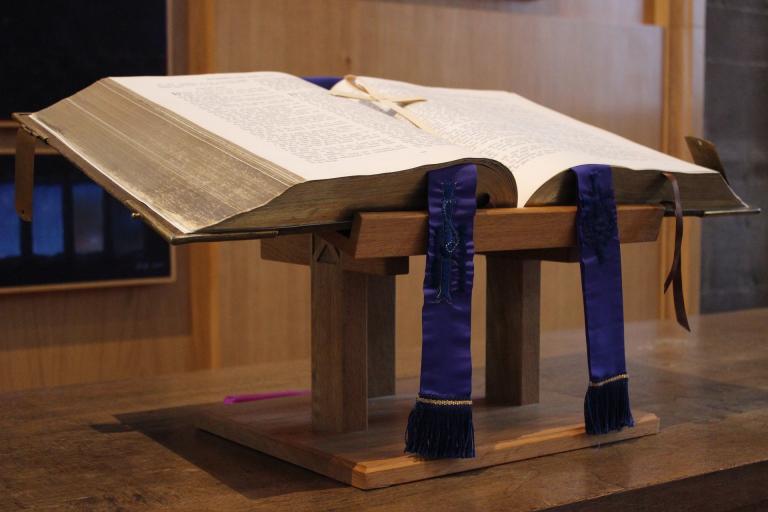
In the 17 years that I was a Roman Catholic, I heard exactly one sermon one domestic violence. I’d attended probably nearly a thousand Masses, and yet this was the first time I heard a priest speak directly about the suffering in my home. About a month later, I finally called the police on my ex. That one sermon made all the difference in the world.
About one in three women, and one in four men, experience some form of intimate partner violence. (For the sake of simplicity, I’m going to write this using pronouns that assume a male perpetrator and a female victim because in Christian culture, particularly, this is the pattern that tends to be enabled.)
Domestic abuse is a very common sin, and yet it’s one that is almost never addressed in church. I heard lots of sermons about how to forgive my spouse, how to make up when we fought, how to strengthen and fight for my marriage. But the idea that sometimes you have to leave was always presented as highly peripheral, applicable in only a very small number of cases. hardly worth mentioning except as an aside.
Fortunately, when I finally did hear a sermon that directly addressed the problem, it was pitch-perfect. I don’t know if the priest who delivered it had consulted with experts in DV before he spoke about it, but I wouldn’t be surprised if he had. What he said was exactly right — but it wasn’t the first thing most pastors would come up with if they decided to broach this topic.
Overcoming Barriers to Preaching
I suspect that for many religious authorities, domestic violence is an uncomfortable subject. It might not be on the radar for any number of reasons. And there may be pressure not to speak on it: I’m sure that there are pastors who stuck their neck out once and got an earful from conservative parishioners about how they were “contributing to the destruction of the family.”
I would note, because I think this is very important, that if you have a respectable man in your community who upbraids you for talking about domestic violence, consider the very real possibility that he is abusing his own family at home. For some reason we often don’t consider that the person putting us in our place for talking about a problem is very often someone who has a vested, personal interest in having that problem kept out of the light.
Many abusive and narcissistic people appear, in public, to be upstanding Christians. I can’t count the number of people I know who grew up in abusive households with fathers who were considered to be very good, holy, family men. Or with narcissistic mothers who put on an elaborate, and often convincing, show of pious propriety in public. In many cases one of the biggest difficulties that abuse victims face is the disbelief of their church community.
Pastors should also be a aware that if a woman becomes upset with you for speaking about violence against women in the home and accuses you of “breaking up families” or some such thing, there is a significant likelihood that she is a victim who is repeating to you what her spouse has said to her. It’s actually quite a common dynamic for an abuser to coax his victims into justifying or defending his actions.
A Private Affair
Another obstacle that can prevent pastors from preaching about domestic violence is the perception that if victims need help, they will ask for it. Many of the pastors that I’ve spoken to believe that they are supportive of victims, but they don’t talk about it in their sermons. Many think “If a woman comes to me, of course I will believe her and help her out. But this isn’t something that affects most people in the parish, so….”
Pastors should be aware that victims of domestic violence are often reluctant to approach spiritual leaders about the problems in their marriages. Most will not approach the church until the abuse has been going on for a long time and has become very severe. Indeed, “research finds women in the church usually only go to their pastors when partners do something so violent they fear they will die.”
There are a number of reasons why victims avoid seeking help, some of which apply to secular authorities as well as church leaders, and some of which are particular to Christian pastors.
First, the victim may fear that they will be castigated if they seek help. Abusive people often “run down” their partners, repeatedly telling them that they are at fault for the chaos and hostility in the home. Approaching a moral authority who might confirm their fears that they are the cause of the problems can be a daunting prospect.
Nor is this fear entirely unwarranted. Christian culture is often awash with ideas and narratives that can serve to enable domestic abusers. It is common for women who do approach Christian leaders about domestic violence to be told that they need to forgive, pray, hold out hope for change, give the abuser more chances, work to better uphold and support him, and to be gentler, more humble, and more submissive. Divorce is often portrayed as a non-option, and victims may be told that even if they do leave they will not be able to pursue another relationship — a situation that can leave women especially vulnerable if they lack the resources to independently care for their children.
Another obstacle is that victims may lack confidence that their pastor will handle the situation appropriately. When talking to priests and pastors about domestic abuse, one of the most common responses I see is “I wouldn’t tolerate that in my parish. I would sit the guy down and…” The first instinct of many pastors, especially male pastors, is to confront the abuser about his behaviour.
Such confrontations can place a victim in a dangerous and precarious situation. The abuser’s first line of defense will be to try to get the intervening pastor on his side, or at least to present the situation as if there is equal fault on both sides. Whether that works or not, the abuser will likely twist the pastors words after the fact so that they implicate the victim. I will never know, for example, whether the priest at one of our local parishes told my ex that he felt my feminism and growing disenchantment with Catholicism was the real cause of concern in our household — but I do know that’s what my ex told me.
Finally, abusive people almost invariably become angry, and often vindictive, if they find out that their victim is seeking help from an outsider authority. The pastor who sits an abusive man down and lays out the Bible’s expectations of him may leave feeling that he’s made the situation better. In reality, the abuser will most likely solve the problem by making sure that his victim will not dare to go telling on him again.
Most victims have had this experience at least once, and have learned that trying to get help only makes things worse. If you don’t say anything from the pulpit, and don’t give victims a reason to think that you are a safe person, they are very unlikely to approach you. (We’ll talk next time about what pastors can do to make sure that the pastor’s office is actually a safe place for victims of abuse.)
But let’s say that you’ve moved beyond the discomfort stage. You’re reading this article, so that means that it is on your radar. How should you talk about it?
Preaching to the Devil
While I did not hear sermons about domestic violence during most of my years as a Catholic, I heard a lot of sermons about how husbands are supposed to love and respect their wives. St. Paul’s counsels on marriage come up periodically in the liturgical calendar, and they are a source of obvious dread for a lot of homilists. The line about wives being obedient is cringe-worthy to most pastors and almost all parishioners, so the general trend is to shift focus to what Paul says to men: ” husbands ought to love their wives as their own bodies. He who loves his wife loves himself.” (Eph. 5:28)
I’m sure a lot of the priests who spoke about this verse thought that they were addressing domestic violence. They would say things like “Obviously a man should never hit his wife. But it’s more than that…” then they would talk about how important it is for a husband to put his wife first, to respect her, uphold her, and support her. Clearly such attitudes are not compatible with physical or emotional abuse. Right?
The problem is that this kind of sermon is meant to address domestic abuse by appealing to the conscience of the abuser.
That might work for a man who takes his wife for granted, but not for an abusive man. Abusers almost invariably externalize guilt. An abusive man never hits his wife; she makes him hit her. He never lies to the authorities; the authorities force him to lie. His bad behavious is always really somebody else’s fault — and most often, it’s the fault of his victims.
So if an abusive man hears a sermon like that he might say something like this to his wife on the ride home:
“I hate how these cowardly, milksop priests are constantly watering down Scripture. He’s afraid that if he talks about what the passage really means (about wives being obedient) he’ll be crucified by the feminists. So instead he resorts to these mealy-mouthed platitudes.”
“I think what he said about respect is really important. It’s a two way street, you know. When a wife obeys her husband, she’s showing him respect. When you’re always on my case, I don’t feel respected.”
“I agree that husbands must always show respect for their wives and put them first. That’s why I put you first. I just wish you’d show a little more gratitude.”
One way or another, if the abuser engages with the homily at all, it will be to use it to his own advantage. Authoritarian and controlling people are generally terrified of being subjected to external authority (including religious authority) unless that authority bolsters their own position. If you are a pastor with an abusive person in your parish, that person will either see you as an enemy (because you threaten their control) or as an ally (because you say things that they can twist or manipulate to further establish control.)
This isn’t to say that there is no appropriate way to preach to abusive people, but rather that the approach that most pastors take (trying to appeal directly to conscience) is ineffective and often counter-productive.
Empower the Victim
The sermon that helped me find the courage to leave didn’t talk about my ex’s responsibilities. It talked about my rights, and most importantly, about the right of my children to live in safety, without fear of being subjected to abuse. It did not, however, scold me or instruct me to do anything. The priest did not say “If this is going on in your home, you have to get help.” He said “If this is going on you have the right to get help.”
There’s a huge, and very important difference between these two statements. Telling an abused person that they have to get help, have to get out, seems like it would be a good idea: after all, the abuser is telling her that she has an obligation to stay, so if you tell her that she has an obligation to leave maybe you will challenge that thinking. Right?
Wrong.
Being in an abusive marriage is like being the rope in a tug-of-war. In the one hand, you face a constant barrage of expectations and demands from your spouse — and if you don’t meet them, there are direct and immediate physical or emotional consequences. On the other hand, there is always a chorus of external voices telling your that you should leave, that you shouldn’t “put up with” this kind of treatment, that you have to make it stop.
Both sides are basically putting all of the weight of responsibility for the problem on the victim. Either she makes it stop by being a perfect wife, or she makes it stop by having more courage and “standing up” for herself. Either way, the onus is on her.
People in abusive relationships are trained always to think of other people’s needs, other people’s emotions, first. So when you tell a woman that she “has to leave” what she hears is “I have a problem, which is that what I’m seeing in your life is making me uncomfortable. I want you to solve this problem for me.” This is why victims so often respond to expressions of concern by minimizing or by explaining how really things have been getting much better. This is the simplest strategy for managing the conflict between your concerns and their abuser’s demands.
The victim erases herself from the equation instinctively. The problem she is trying to solve is not that she is being hurt, it is that you are upset about her being hurt.
If you say “You have a right not to be treated this way” there is no course of action that you are prescribing. The problem is not your feelings about the abuse. The problem is the mistreatment that she is facing. “If you are being treated this way, you have a right to leave.” This isn’t yet another obligation being heaped up on her plate. It’s a right that she is allowed to claim.
Open the Door
Telling a victim that she has a right to live free of abuse is only helpful if it is accompanied by guiding her towards the support that she needs to claim that right. A victim may know that they have a “right” to better treatment, but still feel trapped. Abusers often tell their victims that things will be much worse if they decide to leave. It may be direct threats (“I will kill you if you ever try to leave me”) or it may involve making her afraid to get help: telling the victim that she is just as bad, that if she goes to the authorities they will take away her children because she is a terrible mother, that she is crazy and that the police will be able to see that.
Undermining these fears is key. The priest who told me that I had a right to leave didn’t dwell on that point for very long. Mostly what he spoke about is how Canada is a Christian nation because the law favours the vulnerable: women and children. This was a brilliant move for two reasons.
First, it undermined years of hearing from conservative Christian sources that Canada is a godless nation because the law destroys marriages and breaks up families. Pastors need to be aware that Christian culture often promotes narratives and ideas that make women feel like getting help is wrong. Secular authorities are routinely vilified, particularly when they address women’s rights, and the discourse surrounding divorce and “parental rights” often paints the resources that exist to protect victims as part of a “Satanic plot” to destroy the family, persecute Christians and undermine the gospel.
Many Christian women who are trapped in abusive marriages believe that telling the truth about what is going on in their marriage would be a violation of their marriage vows, a betrayal of their faith, an act of cooperation with evil.
Secondly, it helped to break down the fear that I had about reaching out for help. It wasn’t just that I had been told that the world was godless. I had also been taught to be paranoid about the resources that exist to help women and children get out of abusive family situations.
Abusive men often tune in to media that promotes fear of secular authorities in the name of “traditional family values.” And it’s common for abusers to control, or try to control, their victims access to media. So victims may have a much higher exposure to these messages than that average person in the pews would. For example, my ex used to routinely bombard me with stories of children being “kidnapped” by the authorities, of sex-trafficking rings in child protection circles, of homeschooling families being “persecuted” by the Children’s Aid Society, etc. For years, I was genuinely terrified that if I ever talked to the authorities they would do everything in their power to take my children away from me.
Hearing from the pulpit that it was right and just for me to reach out, and that the authorities were on my side, made a huge difference.
I would, here, offer a brief caveat: in some areas, the police really are not helpful in cases of domestic abuse. Rates of domestic violence are substantially higher among police than in the general population, and reports of police doing nothing, dismissing concerns or even placing victims in greater danger abound. Researching police responses in your area may be essential before recommending that women contact law enforcement.
However, most areas have supports in place for victims of domestic violence. If you know what those supports are, and what they offer, you can help victims by making them more aware of what is available, and by reassuring them that it is okay to access those supports. Ideally, you should be able to offer yourself as a safe person who can help victims to navigate available resources and seek freedom from abuse.
If nothing else, speaking publicly about a victim’s right to leave an abusive marriage will help to change the culture in your church. Even if a woman in an abusive situation is afraid to talk directly to her pastor, she will most likely have conversations with other parishioners. Speaking up about this will not only encourage victims of domestic violence to feel like they can approach the church for help, it will also help to foster a church community that is willing to step up and support women who need help to leave.
Next time, we’ll talk about what pastors should know about domestic violence in order to make churches a safer place for victims of abuse.
Image by Mariusz Matuszewski from Pixabay











